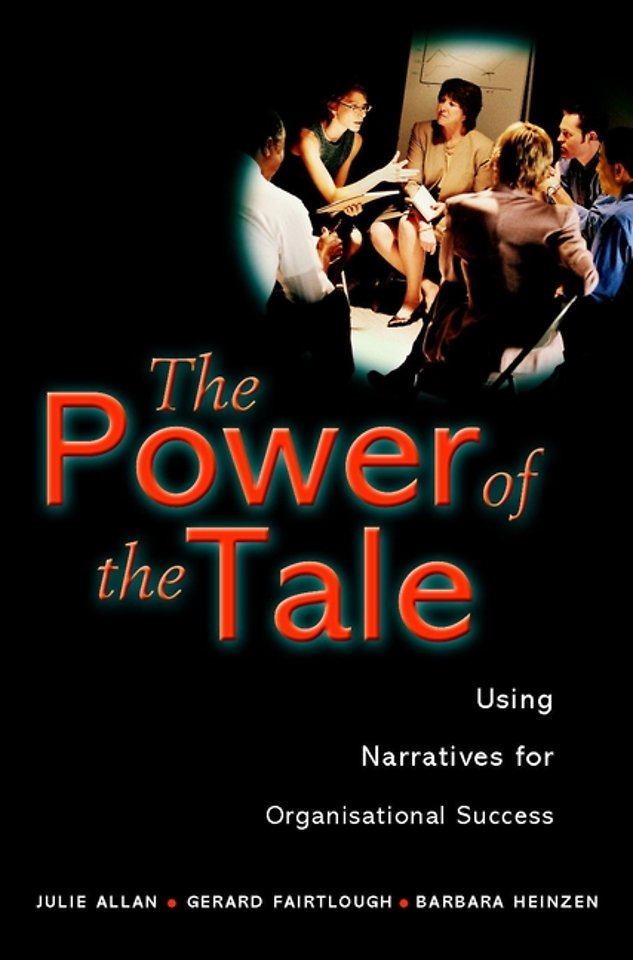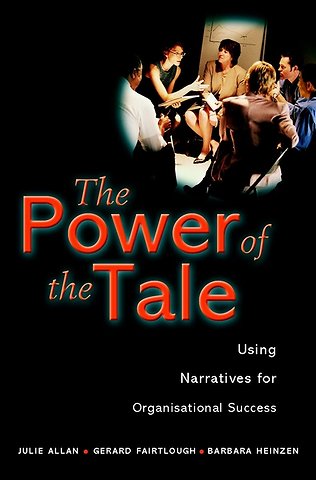The Power of the Tale – Using Narratives for Organisational Success
Using Narratives for Organisational Success
Gebonden Engels 2002 9780470842270Samenvatting
" . . . I thoroughly endorse the book. . . Fairtlough is an excellent thinker."
Napier Collyns
"Takes Arie de Geus′s thinking forward . . I have no hesitation in recommending it for publication."
Gill Ringland
"The most important aspect is the potential to legitimise the use of storytelling in a business environment . . and help management think outside the box."
Arie de Geus
Story–telling is one of the best ways for individuals, groups, organizations and societies to learn. Skill in story–telling and in other narrative activities allows us to understand complexity, live with uncertainty, communicate well and increase personal and organizational effectiveness. As organizations move away from old–fashioned command and control, they will increasingly need the bonds of shared stories, which create shared language, shared visions and shared values.
Specificaties
Lezersrecensies
Inhoudsopgave
<br />
<br /> 1 Stories in Action
<br />
<br /> Resistance to story–telling
<br />
<br /> How story–telling works its magic
<br />
<br /> Types of narrative
<br />
<br /> Ways of creating stories
<br />
<br /> Story–telling skills
<br />
<br /> Seven histories
<br />
<br /> The rest of the book
<br />
<br /> What readers will get from the book
<br />
<br /> 2 M4 Technology –
<br /> Stories for Truth and Trust
<br />
<br /> Communication
<br />
<br /> This chapter
<br />
<br /> A theory of truth and trust
<br />
<br /> Practices and stories
<br />
<br /> Accept vulnerability
<br />
<br /> Seek empathy
<br />
<br /> Seek transparency
<br />
<br /> Promote dialogue
<br />
<br /> Avoid groupthink
<br />
<br /> Support truthful politics
<br />
<br /> Conclusion
<br />
<br /> 3 AutoCorp –
<br /> Learning
<br />
<br /> Individual learning
<br />
<br /> AutoCorp: the past
<br />
<br /> AutoCorp: stories for the future
<br />
<br /> A training tale
<br />
<br /> A coaching tale
<br />
<br /> A mentoring tale
<br />
<br /> A cautionary tale about not learning
<br />
<br /> Conclusion
<br />
<br /> 4 Themis –
<br /> Using Stories in a Professional Development Community
<br />
<br /> Lyn′s story
<br />
<br /> Perspectives and practices
<br />
<br /> The history of Themis
<br />
<br /> A note on written stories
<br />
<br /> Conclusion
<br />
<br /> 5 Matters of Life and Death –
<br /> Using stories in the National Health Service
<br />
<br /> Value conflicts
<br />
<br /> Embracing error
<br />
<br /> Trusting your judgement
<br />
<br /> A positive approach to dilemmas
<br />
<br /> Stories about stories
<br />
<br /> Barchester District
<br />
<br /> Complexity
<br />
<br /> Conclusion
<br />
<br /> 6 AutoCorp –
<br /> Evolving
<br />
<br /> Facilitating change
<br />
<br /> Coping with complexity
<br />
<br /> Another virtuous circle
<br />
<br /> AutoCorp′s change programme
<br />
<br /> Uncertainty
<br />
<br /> Ambiguity
<br />
<br /> Self–organising change at AutoCorp
<br />
<br /> An experiment in self–organisation
<br />
<br /> Conclusion
<br />
<br /> 7 LIFT –
<br /> Stories for Innovation
<br />
<br /> The London International Festival of Theatre
<br />
<br /> Imagination, vision and stories
<br />
<br /> Stimulating your imagination
<br />
<br /> Making connections
<br />
<br /> The right space to tell the tale
<br />
<br /> Boundary spanning
<br />
<br /> Building an organisation
<br />
<br /> Expanding the vision
<br />
<br /> Renewing the vision
<br />
<br /> Conclusion
<br />
<br /> 8 Kenya –
<br /> Scenarios for a Country′s Future
<br />
<br /> The Mont Fleur scenarios
<br />
<br /> The benefits of scenarios
<br />
<br /> Kenya
<br />
<br /> Story–telling and scenarios
<br />
<br /> Mount Kenya Safari Club
<br />
<br /> The research workshop
<br />
<br /> Detoxifying the mind
<br />
<br /> Further workshops –
<br /> Lake Baringo, Mombasa and Amboseli
<br />
<br /> The scenarios
<br />
<br /> Influence of the scenario project
<br />
<br /> Conclusion
<br />
<br /> 9 Thinking about Stories
<br />
<br /> Story characteristics
<br />
<br /> Stories in organisations
<br />
<br /> Stories and learning
<br />
<br /> Stories and society
<br />
<br /> Conclusion
<br />
<br /> 10 Tools and Techniques for Story Use
<br />
<br /> A note on ethics
<br />
<br /> Chapter format
<br />
<br /> Story–telling frameworks and starting points
<br />
<br /> Workshop games and activities
<br />
<br /> Developing your own skills
<br />
<br /> A note on story–telling and organisational research
<br />
<br /> Conclusion
<br />
<br /> 11 The Future of Story–telling in Organisations
<br />
<br /> Key points from the seven histories
<br />
<br /> What we learned while writing this book
<br />
<br /> Story–telling and complexity
<br />
<br /> Respect for other people
<br />
<br /> Art and emotion
<br />
<br /> Negative possibilities
<br />
<br /> Story–telling and sustainability
<br />
<br /> References
<br />
<br /> Further Reading and Resources
<br />
<br /> Index of Stories
<br />
<br /> Subject and Author Index
Anderen die dit kochten, kochten ook
Rubrieken
- advisering
- algemeen management
- coaching en trainen
- communicatie en media
- economie
- financieel management
- inkoop en logistiek
- internet en social media
- it-management / ict
- juridisch
- leiderschap
- marketing
- mens en maatschappij
- non-profit
- ondernemen
- organisatiekunde
- personal finance
- personeelsmanagement
- persoonlijke effectiviteit
- projectmanagement
- psychologie
- reclame en verkoop
- strategisch management
- verandermanagement
- werk en loopbaan







